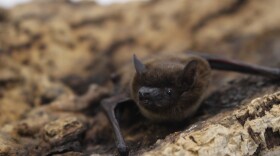-
An "evening bat" was found with an injured wing. The species mostly lives in the southeast and central parts of the U.S.
-
Instead of looking to Pennsylvania for a Punxsutawney prediction, Boulderites consult a local marmot.
-
Species most at risk will be familiar to Coloradans, including the state bird and fish.
-
Preparations are beginning in Colorado to reintroduce another predator to the wild, and some prominent critics of wolves are behind the effort to bring back the wolverine.
-
Colorado Parks and Wildlife says the bald eagle had a ball bearing in its wing when they found it near Croke Reservoir.
-
The state wildlife action plan is required every ten years to receive federal funding for conservation efforts.
-
Despite ice covering a popular reservoir, a recent video from Colorado Parks and Wildlife shows how otters stay warm in the winter.
-
Federal land managers are reopening their environmental review of a massive transmission line proposed across Nevada, a move conservation groups say could reshape how energy infrastructure is approved on public lands across the West.
-
The recent fatal mountain lion attack on New Year’s Day may have people wondering how state wildlife officials manage Colorado’s population of these animals – and what precautions we can take to avoid a dangerous encounter with a mountain lion. We get some answers from a Colorado Parks and Wildlife expert.
-
The U.S. Fish and Wildlife Service says it’s looking for ways to make hundreds of wildlife refuges and dozens of fish hatcheries more efficient.

Play Live Radio
Next Up:
0:00
0:00
Available On Air Stations










